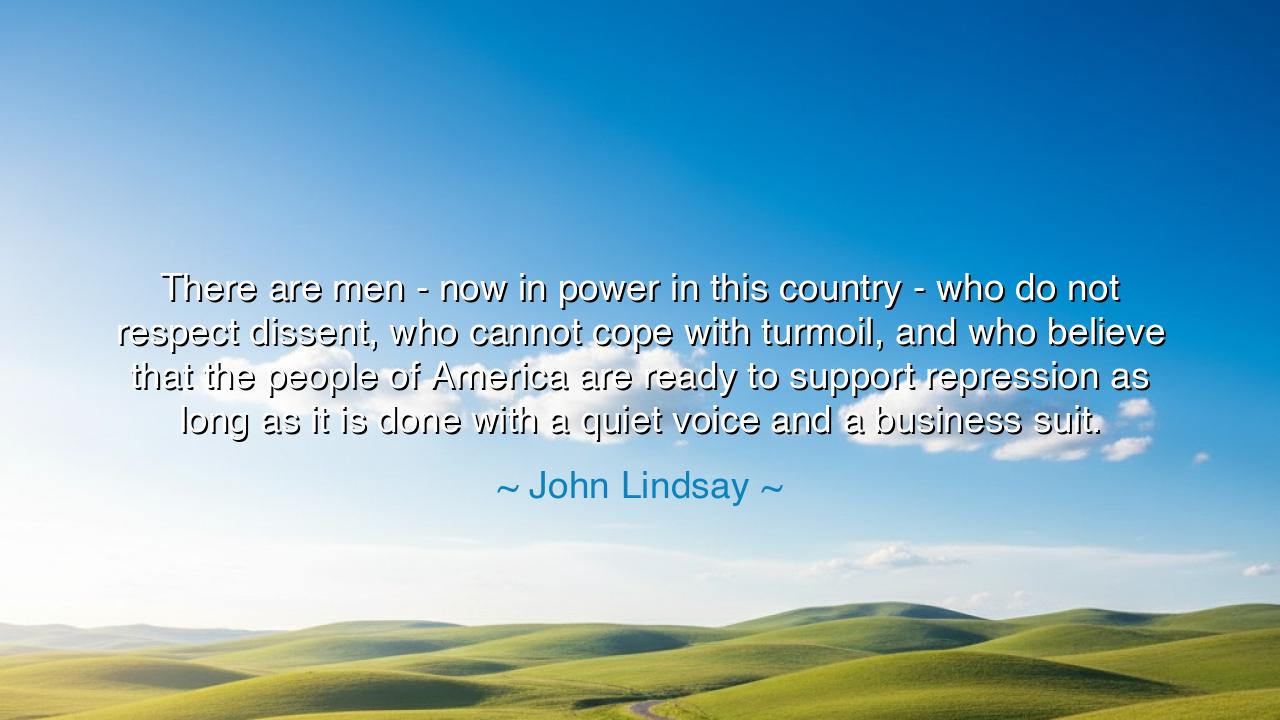
There are men - now in power in this country - who do not respect
There are men - now in power in this country - who do not respect dissent, who cannot cope with turmoil, and who believe that the people of America are ready to support repression as long as it is done with a quiet voice and a business suit.






In the stirring words of John Lindsay, “There are men—now in power in this country—who do not respect dissent, who cannot cope with turmoil, and who believe that the people of America are ready to support repression as long as it is done with a quiet voice and a business suit,” we hear the cry of a man defending the soul of democracy. His words cut through the polite silence of conformity and reveal a truth that has haunted every age: that tyranny does not always arrive with the stomp of boots and the clang of chains—it often comes dressed in civility, wrapped in reason, and spoken in calm tones by men who mistake control for order. Lindsay’s warning is timeless, for he speaks of the moment when power forgets humility, and when the guardians of freedom become its quiet destroyers.
The origin of this quote lies in the turbulence of the late 1960s, when America was torn by war abroad and division at home. As mayor of New York City, John Lindsay witnessed protests, civil unrest, and the desperate struggle of citizens demanding justice, equality, and peace. He saw how those in high office sought not to understand dissent, but to suppress it—how they feared the chaos of democracy more than the stillness of repression. His words, spoken during this era, were a rebuke to those who believed that peace could be purchased at the cost of freedom, that silence could replace dialogue, and that respectability could disguise cruelty. Lindsay, though himself a man of government, spoke as one who remembered that authority without compassion is tyranny in disguise.
To the ancients, dissent was the heartbeat of wisdom. Socrates, in the streets of Athens, was condemned not because he threatened the state with violence, but because he threatened it with questions. His calm inquiries shook the complacency of the powerful, who preferred the comfort of illusion to the discomfort of truth. Like Socrates, Lindsay reminds us that a nation dies not when it argues, but when it stops arguing. When power demands silence in the name of order, when citizens trade conscience for convenience, the flame of liberty flickers and begins to fade. For true order is not the absence of turmoil—it is the harmony born from justice.
The imagery of Lindsay’s words—the “quiet voice” and the “business suit”—is deliberate and piercing. He warns that repression does not always roar; it can whisper. It can come through bureaucracy, policy, and politeness, all cloaked in the language of stability. History bears witness to this truth. In the Weimar Republic, democracy gave way not through a single violent act, but through the gradual erosion of vigilance. Each law, each decree, each “necessary measure” was justified by men who claimed to protect order. And when the people finally noticed, freedom was already gone. Lindsay’s insight, therefore, is not only political—it is moral. He reminds us that evil often enters the world disguised as moderation and that complacency is the ally of oppression.
His words also serve as a mirror to every generation, for the battle between freedom and comfort is eternal. Many will choose the security of quiet over the courage of dissent. But Lindsay calls upon the few—the awake, the restless, the ones who still believe in truth spoken aloud—to stand firm even when their voices shake. For dissent, though noisy and uncomfortable, is the forge of progress. Every movement that ever uplifted humanity—the abolition of slavery, the fight for women’s rights, the struggle for civil equality—was born in turmoil, in protest, in the refusal to bow to unjust peace. Rebellion against injustice is not disorder—it is the restoration of balance.
Consider the story of Martin Luther King Jr., who was labeled a disruptor and an agitator by those who claimed to value peace. His protests were met with calls for “patience” and “decorum.” Yet, had he remained silent, had he spoken in the “quiet voice” that Lindsay warns of, America would still be deaf to its conscience. The civil rights movement triumphed not because it avoided turmoil, but because it transformed turmoil into awakening. Lindsay’s words align with this eternal truth: that every society must choose between the false calm of repression and the vibrant, difficult, beautiful chaos of liberty.
From these words, a lesson emerges for all who would lead, and for all who would live freely: do not mistake silence for peace, nor comfort for justice. Beware of those who speak softly but act cruelly, who wear the mask of order while choking the breath of freedom. Question them, even when it is dangerous. Dissent is not the enemy of democracy—it is its guardian. Let your conscience speak even when the world asks for quiet. For a free people’s duty is not only to obey, but to remember, resist, and renew the promise of liberty in every generation.
And so, as John Lindsay teaches us, the true test of a nation’s greatness lies not in how it handles agreement, but in how it honors dissent. When power is cloaked in civility, when oppression comes dressed in respectability, let the citizens see through the disguise. Let them rise, let them speak, and let them preserve the sacred noise of freedom. For though tyranny may whisper in soft tones, the voice of truth must thunder still — unafraid, unbroken, and eternal.






AAdministratorAdministrator
Welcome, honored guests. Please leave a comment, we will respond soon